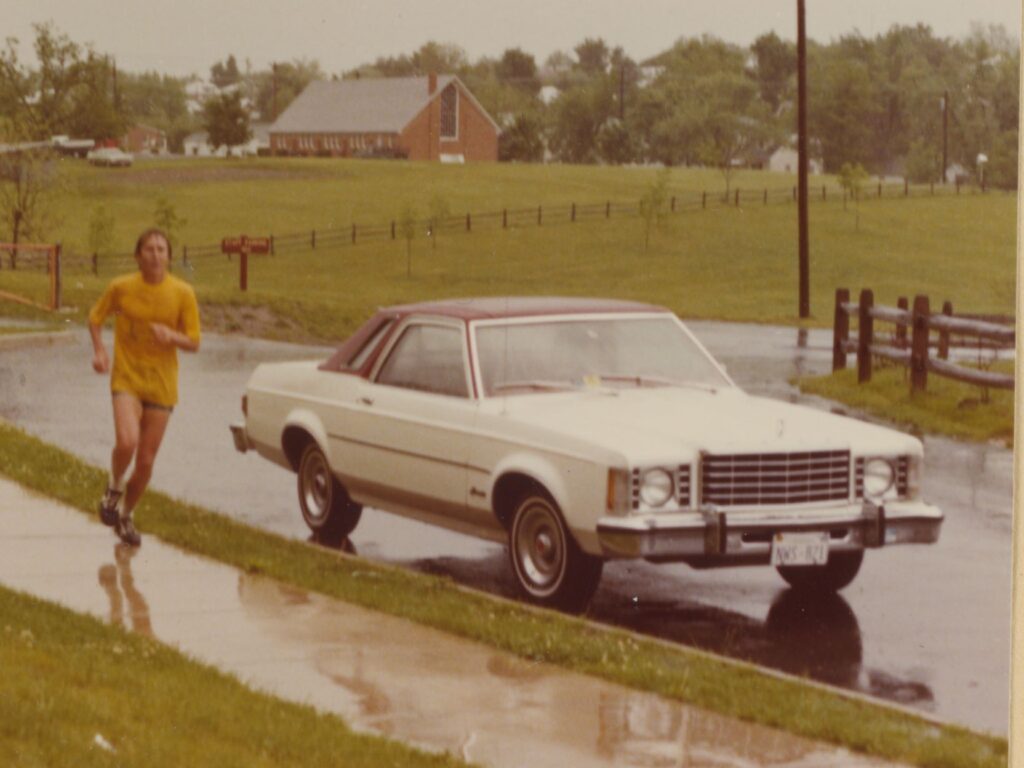Interpreting an entire era is a substantial challenge, but that is what Special Collections intern Alex Thompson ’25 and I did for the latest Special Collections exhibition, “Find Yourself in the 1970s: Snapshots of Life at Bridgewater College.”
Certain themesbegan to emerge as we searched the College archives to shape the exhibition. The era looked like a fun time to be on campus. The 1970s yearbooks, catalogs, newsletters and newspapers showed BC students enjoying a variety of academic, social and athletic activities. They were also expressing themselves through resisting campus rules and engaging with broader societal issues, such as race relations and the Vietnam War.
One item in the Newlen-Bradford Special Collections that I believe especially personifies this combination of fun and self-expression is a scrapbook from a Mother’s Day CROP (Christian Rural Overseas Program) Hunger Walk in 1979. The scrapbook belonged to Dr. Robbie Miller ’79, student at BC in the 1970s and College Chaplain from 1990-2023, who donated the scrapbook to Special Collections upon his retirement.
CROP Hunger Walks are an ongoing tradition of Church World Service, an interdenominational Christian humanitarian organization. These sponsored walks began in the 1960s and are fundraisers for alleviating hunger and poverty in the United States and internationally. In 1979 the 10-mile walk was sponsored by BC’s Student Committee for Religious Activities and began and ended at Westover Park in Harrisonburg, Va.
The CROP Hunger Walk scrapbook preserves ephemera such as flyers and newspaper clippings chronicling the event. It includes candid and colorful snapshots of Bridgewater students participating in the walk. An original flyer stresses that the walk will be held rain or shine, particularly prescient since some of the snapshots show students looking rather wet.
Photographs preserved in such alumni scrapbooks are special because they are often one-of-a-kind glimpses capturing unique moments in time. Unlike some of the yearbook photographs, those in scrapbooks were neither posed nor published. I always get excited at new scrapbooks showing a slice of life captured for students by students.
Beyond its connection to Bridgewater, the 1979 CROP Hunger Walk scrapbook is also important because it gives evidence to the fashions and environment of the time, complete with yellow rain slickers, clear umbrellas and period cars.
Alex focused his research on how Bridgewater students reacted to the Vietnam War, which continued until the spring semester of 1975. Students in the early half of the decade were still concerned about the possibility of being drafted, as was evidenced by a “Draft Counselor” column in The Talon, BC’s studentnewspaper. In the column, students shared draft advice and policy updates for conscientious objectors.
Alex also discovered that at least three BC students lost their lives in Vietnam. To remember them, we developed an abridged interpretation of the “Missing Man Table” that is displayed in dining halls and at formal event in the military to remember service members who are missing, imprisoned or killed in service.
“Researching the Vietnam War’s impact on Bridgewater College during the 1970s was captivating and challenging,” Alex said.
Meanwhile, I wanted to focus on the Church of the Brethren and showcase individuals who were doing peace work at the time. In the exhibition are artifacts from the Reuel B. Pritchett Museum Collection including Russian art collected by W. Harold Row ‘33 during his Cold War era exchange work between the Church of the Brethren and the Russian Orthodox Church. We will also exhibit materials from other alumni including feminist author and Church of the Brethren minister Beth Glick-Rieman ’44 and Brethren Volunteer Service participant and conscientious objector Dr. Harold Furr ’68.
Of course, we will also have a first-year beanie on display, one worn in 1971 by Joseph Yamine ’75.
We hope that you can find yourself a little in the “Find Yourself” decade and its diverse perspectives. For exhibition hours and additional information, see our press release.
– Stephanie S. Gardner
Special Collections Librarian
10/15/24


